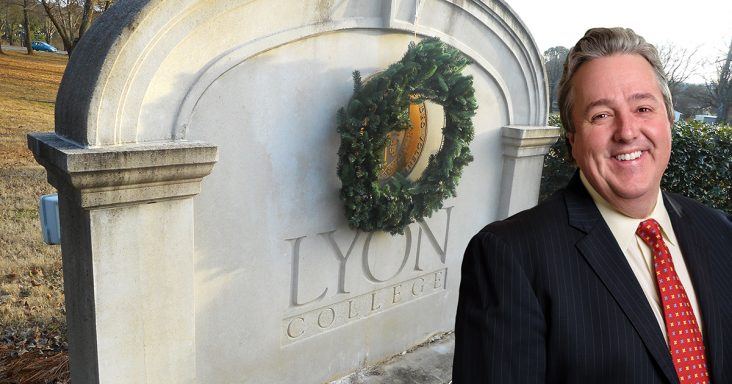Lyon College leader bringing his startup skills to higher ed
by February 5, 2020 2:54 pm 1,831 views

Lyon College President Dr. W. Joseph King.
It was the mid-1990s and startup technology companies were the rage. The internet had just burst onto the scene, and people in their early 20s were becoming millionaires almost on a daily basis. Young entrepreneur Dr. W. Joseph King decided it was time to throw his hat into the technology boom ring.
He became the president of Zama Networks and during his time as an entrepreneur, he played a key role in establishing a company that is now worth more than $8 billion today. In the early 2000s, the technology bubble crumbled and King decided to pursue another love of his – higher education.
He took a circuitous route through higher ed, but in 2017 he was named the 18th president of Lyon College in Batesville. He told Talk Business & Politics he was pleased to take a job in the heart of the Arkansas Ozarks.
“I wanted to be in a place that was growing,” he said.
Lyon College is one of the oldest colleges in the state. Founded as Arkansas College by Arkansas Presbyterians, Lyon College opened its doors in September 1872. Originally located in downtown Batesville, the college remained under the guidance of the Long family for much of its first four decades. Rev. Isaac J. Long served as president from the college’s founding until his death in 1891 and his son, Eugene R. Long, served two terms as president, 1891 to 1895 and 1897 to 1913, according to the school. It was co-educational from the beginning. The school changed its name to Lyon College in 1994.
In the early 2000s, King was at a professional crossroads. He helped to start several companies in the technology sector, but the landscape was changing. It was becoming more difficult to build a “team” and it was taking much longer for new innovations to get to market. Finding investors became much more difficult after the recession in 2001, too, he said.
“Even if you had a great idea, it was going to take awhile … it was hard to keep doing the same thing over and over again,” he said. “I needed something different to do.”
By 2005, King was working for Rice University. He became the executive director of Connexions at Rice, and he led the first large-scale open education initiative. Just prior to his hire at Lyon, he served as senior adviser to the president of Emory & Henry College. As executive director of the National Institute for Technology in Liberal Education, he helped almost 140 liberal arts colleges integrate inquiry, pedagogy, and technology to become more strategic and innovative.
Similarly, as vice president of innovation at Southwestern University, he focused on strategic opportunities. King co-authored a book, How to Run a College, and has another book, Leading a College, that will be released in the fall of this year.
Lyon College, like many other universities and colleges around the country is about to face a significant problem and the genesis of this problem began during the Great Recession that started in the fall of 2008. That recession, the worst since the Great Depression, caused a seismic shift in the jobs market and in population. People during that time couldn’t afford to have as many children, so around 2024 and beyond there will be a significant drop in the number of students available to attend college.
“By mid-decade, we could see drops of 15% to 25%,” he said. “The long-term dynamics are going to be dramatic.”
Confronting this challenge will be difficult, but King said his school is taking steps to stave off a precipitous student roster drop. Recently, the school has added a ROTC program and an exercise science program. The business degree program is also being revamped.
As traditional students become harder to enroll, the school will have to adapt, King said. The college will have to find ways to reach out to nontraditional and first generation students. The Hispanic population is rapidly growing in the area and that could be a strong source of new students, he added.
The college has always had an association with the University of Arkansas Community College at Batesville and that relationship has expanded. Many students that graduate from UACCB with two-year degrees live in the area and those educated students that already live in the area are ideal transfer candidates, he said. Lyon has actually opened an office on the UACCB campus to help facilitate transfers.
Lyon College has about 650 students this year and that equates to a 12:1 student/teacher ratio, one of the best in the state, King said. Each year about 98% of graduates have a job or are in a graduate program within six months, he said. Personally knowing teachers and faculty can have a significant impact on a student’s long-term success rate, he said.
“Our intention is to grow … that’s the path we plan to take,” he said.
When he’s not leading his new college or writing, King said he still dabbles in some entrepreneurial pursuits. He didn’t mention anything specific, but he said it’s still in his blood — a little.
“I have a side project or two,” he said with a smile.
